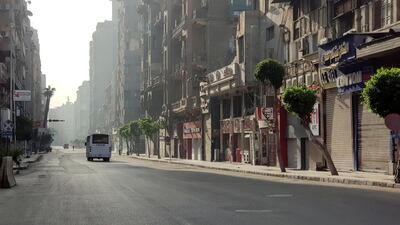Egypt announced new measures on Wednesday to curb the spread of Covid-19, including a ban on mass celebrations, as the country prepares to celebrate Eid Al Fitr.
The new guidelines, announced by Prime Minister Mostafa Madbouly, come into effect on May 6 and end on May 21. Eid Al Fitr is expected to start at sundown on May 12 and end on May 15, but dates could change depending on Moon sightings.
Mr Madbouly said an increase in coronavirus infections was behind the new regulations.
"As a government and as officials, we are deeply worried that citizens are not fully complying with health precautions … we are beginning to see that infections are happening on a familial scale, when one person gets sick [they infect] the whole family," Mr Madbouly said.
Restaurants, cafes, shopping malls and entertainment venues will be required to close at 9pm, a four-hour reduction from the current closing time of 1am. Delivery services, however, will continue operating around the clock.
The new guidelines ban all mass celebrations, which are typically more prolific during the Eid Al Fitr feast as Ramadan abstinence comes to an end.
An official holiday declared between May 12 and May 16 will be in observation of the feast, with businesses in the public and private sectors closing up shop for the duration.
All public beaches and parks will be closed for the two-week period during which the new guidelines are in effect.
May is generally the time when Egyptian holidaymakers start to visit the nation’s beaches, either in the north on the Mediterranean Sea or the coast of the Red Sea.
But as a result of the worsening coronavirus outbreak, holiday resorts announced that, until further notice, they will be particularly strict with enforcing preventive measures, especially with the closing times of food outlets and nightlife venues.
All pools and recreational activities at these establishments will be closed until further notice.
Khaled Baioumy, 33, a pharmacist, went to the north coast for the long weekend and is planning to stay through the summer.
With the ability to work remotely, he stayed from mid-April through September last year. He was disappointed, however, to find the beach blocked by barriers.
“I came for the beach, but it is the worst time,” Mr Baioumy said. “During Eid, it’s usually very crowded, so for the beaches to remain open would be a problem. Last year, the beaches and pools were closed during Eid.”
According to health ministry figures released on Tuesday, the country's Covid-19 case tally reached 231,803 after 1,090 new cases were recorded. The official death toll reached 13,591 after 60 patients died on Tuesday.
It is highly likely that the real numbers of cases and deaths are much higher than official figures indicate, with some specialists estimating that millions of infections were not recorded.
The ministry for religious endowments also announced on Wednesday that mosques, which usually host large numbers of worshippers during the feast, will continue implementing Friday prayers regulations.
Worshippers must wear face masks, while footfall and visiting times at mosques is reduced.




















